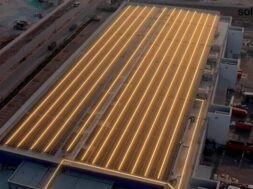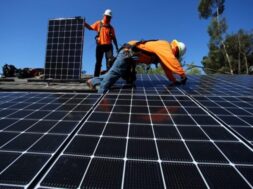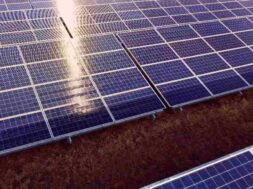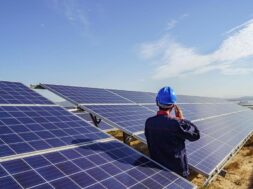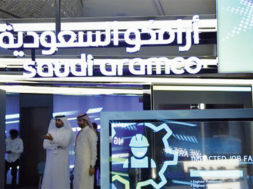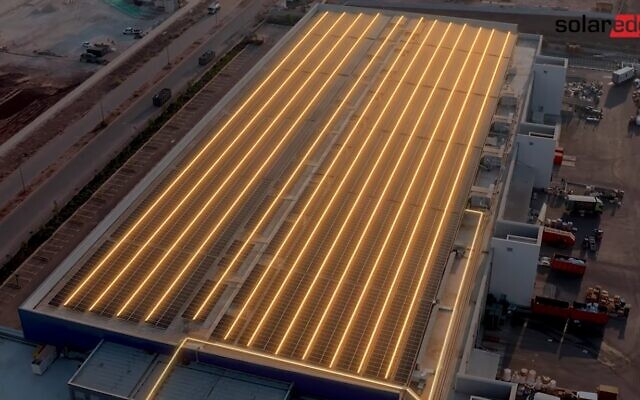
Israeli-American energy tech firm SolarEdge inks investment deal with Saudi group – EQ Mag Pro
Israeli-founded company to ‘explore investment in renewable energy’ with Riyadh-headquartered conglomerate, says Saudi investment ministry
Israeli-founded smart energy tech firm SolarEdge Technologies signed an agreement with Saudi Arabia’s Ajlan & Bros Holding Group Abilitii, a private sector conglomerate based in Riyadh, on the sidelines of US President Joe Biden’s visit to the kingdom on Friday and Saturday.
Based in Herzliya and with US headquarters in California, SolarEdge, which is traded on the Nasdaq and is listed in the S&P 500 index, was one of 13 “leading US companies” to sign investment agreements with Saudi entities, the kingdom’s Ministry of Investment of Saudi Arabia (MISA) said in a statement posted Saturday (without mentioning the company’s Israeli roots).
The Circuit, a Jewish Insider publication, first reported the existence of the investments deals on Sunday.
A person familiar with the SolarEdge agreement told The Circuit that the ministry announcement was “accurate.”
SolarEdge and Ajlan & Bros are slated to “explore investment in renewable energy,” according to the Saudi ministry, which also said the 13 agreements “cover a range of sectors including energy, aerospace, defense, textiles, manufacturing, education and tourism” and “build upon a longstanding economic relationship” between Saudi Arabia and the US.
One of the agreements include a partnership between the ministry and aerospace giant Boeing “in areas relating to aircraft manufacturing.”
SolarEdge was founded in 2006, seeking to make solar energy more affordable and widespread. It developed an inverter solution for harvesting and managing power in solar photovoltaic (PV) systems. In 2010, the company commercialized its SolarEdge direct current (DC) optimized inverter system to increase power generation and lower the cost of energy produced by the solar PV system.
As of July, the company has a market cap of $14.72 billion and is considered among the most-valuable Israeli companies, alongside NICE Systems and cybersecurity giant Check Point Software Technologies.
The SolarEdge deal is the first known public agreement between an Israeli company and a Saudi entity.
Israel and Saudi Arabia do not have official diplomatic relations, but covert ties have warmed in recent years as the Saudi crown prince, Mohammad bin Salman, has reportedly seen Israel as a strategic partner in the fight against Iranian influence in the region.
The kingdom refrained from signing onto the Washington-brokered Abraham Accords in 2020, when the US and Israel had hoped it would, but Riyadh is believed to have given the go-ahead to Bahrain, where it retains decisive influence, to join the normalization agreement with Israel, alongside the United Arab Emirates and Morocco.
After the accords were signed, Saudi Arabia began allowing Israeli airlines to use its airspace for flights to and from the UAE and Bahrain.
Biden arrived in the Saudi city of Jeddah on Friday for a major regional conference, as he tried to reset an important diplomatic relationship with Riyadh, bolster Mideast security, and increase the global flow of oil.
He flew directly from Israel where the president spent two days meeting with Israeli leaders and participating in a host of events. He met with Palestinian officials in the West Bank on Friday before departing for Jeddah.
The president’s trip had also been touted as a push to advance normalization ties between Israel and Saudi Arabia, and the US administration had suggested prior to the trip that significant developments could be in the offing.
Saudi Arabia soon announced that it would open its airspace for all civilian overflights to and from Israel — a move that will enable flights to China and India through far shorter and less costly routes — but denied that this was a step toward normalization.
Saudi Minister of State for Foreign Affairs Adel al-Jubeir also sought to dampen speculation regarding Saudi-Israel normalization, telling CNN in a Thursday interview that, while such a step was “possible” and a “strategic option,” a two-state solution between Israel and the Palestinians was a “requirement” before Riyadh would formalize ties with Jerusalem.
Both the US and Israel considered Riyadh’s overflights decision a “a big deal,” as Biden called it, and “a first tangible step.”
Riyadh made the announcement on opened airspace a day before Biden unveiled the planned withdrawal of an observer force securing a pair of Red Sea Islands, in what will allow their transfer from Egypt to Saudi Arabia. The withdrawal was brokered by the US, and required Israeli authorization because the presence of the observer force, along with an assurance for freedom of transport around the islands for the Jewish state were part of Jerusalem’s conditions to relinquish them to Egypt as part of their 1979 peace treaty.
Though Biden’s trip fell short of securing Saudi Arabia as a signatory to the Abraham Accords, there has been a flurry of reports of economic and business activity.
In late May, the Globes business daily reported that dozens of Israeli tech entrepreneurs and businesspeople had flown to Saudi Arabia for advanced talks on Saudi investments in Israeli companies and investment funds. The report said a number of agreements, both in the civilian and defense sectors, have been since signed between Israelis and Saudis in European and other countries, including a multi-million dollar deal in the agriculture tech sector and a second deal for an Israeli water tech solution.
The Saudis also expressed interest in Israeli medical and health tech solutions, as well as Israeli “products,” the report said without elaborating.
In a Times of Israel interview last week, Israel-American businessman Avi Jorisch said he led a group of some 50 prominent Jewish business leaders visited the kingdom in May to meet with Saudi business and government communities.
Jorisch said there was a particular interest in Israel’s startup culture, and its technological innovations around water, food, defense, and space. “There was a deep interest and a desire to harness some of the capabilities that Israel has created,” Jorsich told The Times of Israel.
Also in May, the Wall Street Journal reported that Saudi Arabia was planning to allocate millions of dollars for investments in Israeli tech companies via Kushner’s new private equity firm. Kushner, Trump’s son-in-law, set up Affinity Partners late last year, raising some $3 billion in committed funding from international investors, including the Saudis.
The Wall Street Journal report said Riyadh has eyed two Israeli companies for investment, though the names of the firms were not disclosed, nor the sectors in which they operate.
